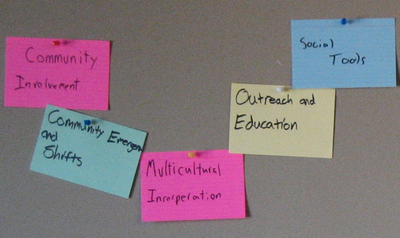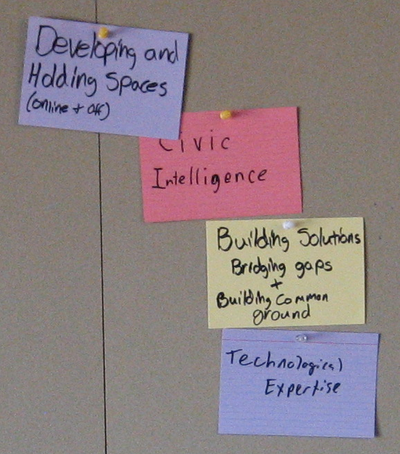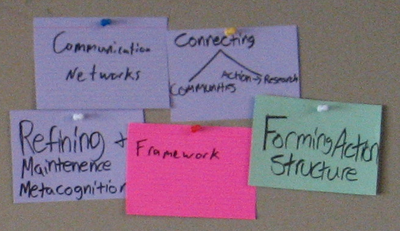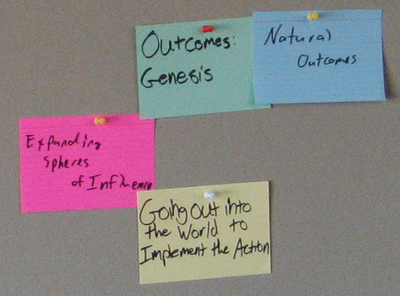CIRAL Group Project
Contents
- 1 Project Description (purpose, etc.)
- 2 Stakeholders
- 3 Implementation Models
- 4 Course Components
- 4.1 Core Class Contents
- 4.2 Course Topics
- 4.3 Course Projects
- 4.3.1 Project Explorations
- 4.3.1.1 Local Economy
- 4.3.1.2 Social Action: Presence and Voice
- 4.3.1.3 Producing a good or a service
- 4.3.1.4 Community Building/Life Enriching Event
- 4.3.1.5 Crowdsourcing information for civic ends
- 4.3.1.6 Organizational Accountability
- 4.3.1.7 Public Mental Health Care
- 4.3.1.8 Non-zero sum game workshop
- 4.3.1.9 Mycorestoration action team with Education and Spawn Bank
- 4.3.1.10 Public Space Clean Up
- 4.3.1.11 Free School Project
- 4.3.1.12 Interactive Wiki Training Game (Galen, ?, ?)
- 4.3.1.13 Revamping Shelters
- 4.3.2 Projects from Workshop
- 4.3.1 Project Explorations
- 4.4 Think Tank / Ongoing Research and Other Work in "Home Office"
- 5 CIRAL Group Project Metacognition
Project Description (purpose, etc.)
The goal of the CIRAL is to create a student lead and run class/organization that encourages and teaches social action for the betterment of not just our society, but those around the world. The focus will be primarily working with local organizations. The hope is that this class will last between 2-10 years, although longer would be preferred.
Among the goals of this project are:
- To create a culture of lifelong education
- Building the skills necessary to be effective citizens
- Integrate community with university, starting locally but expanding in later years
- Integrate social theories with social practice
- Explore and encourage social innovations
This section can be part of the formation of the Evergreen course catalog program description, which Michael is on-board with following through with. (Task For Michael)
Stakeholders
As we flesh out the Implementation Model we'll be able to get a better idea of who we need involved in what capacity. This may become more than just a description of who will be involved in what capacity. Part of our consideration should be how to get these people involved and excited about CIRAL.
- Students in Patterns of Intelligence program
- Prospective CIRAL students
- Olympia community members
- Center for Community-Based Learning and Action (CCBLA)
- Evergreen Faculty
- Evergreen Administration
- Evergreen Alumni, especially members of the Evergreen Alumni Entrepreneur's Association
- Donors (N.B. if allowed. See 'Barriers and Constraints' on this page)
- Others??
Implementation Models
What do we need to find out to flesh these models out? (Tasks For Questioners) (Tasks For Researchers)
Barriers and Constraints
(Tasks For Questioners) (Tasks For Researchers)
We can find out more through the faculty handbook.
We can ask an academic dean. (Task For Brandon)
Requirements for CIRAL Program to be Offered
Faculty
- Does the faculty's status with the school play a part?
Students
- Does there have to be enough student demand/enrollment to be considered? (e.g. Is a Competitive Product Analysis performed to see if it should be offered?)
- Articles 7.2 and 7.3 of the CBA are relevent 7.2 basically says that if enrollment is below what is expected the faculty can make up for it in other ways. 7.3 says that enrollment levels can be reduced for experimental program initiaves.
- Can students specify a demand for class content prior to the course being offered?
- Do various course models change the number of students that can be involved?
- Independent Learning Contract (ILC)
- What can we do to get faculty approval for contracts before students sign on for it?
- Group Contracts
- Is it okay if students sign on to a group contract without having involvement in writing it?
- Inter-class cooperation
- Independent Learning Contract (ILC)
Content
- Does the content have to follow any guidelines (e.g. a need to cover certain academic skills?)
Products
- What are the requirements for the class as a whole, and for individual students?
Measures of Success and Continuation
Program Products
- Are time and work measured when calculating the amount of credit earned?
- Does student performance impact the program's ability to be re-offered?
- Does handing out a high level of incompletes jeopardize the program's or the students' viability to continue? (N.B. Imagining a scenario where project work was not able to finish on time.)
Program Offering Formulations
- What are the different type of program offerings? (See faculty handbook).
- Requirements for students to be able to take the program (Day vs Evening Weekend Studies)
- Ability to work across programs (i.e. between them)
- Ability to have a core class with a credit extension (+4 for community involvement)
Transformative Space Issues
- Helping struggling students to succeed in class, through supportive and transformative means.
- How to tackle potential complaints of plagiarism when supporting your classmates?
- Group agreement as a constraining factor for how credit is earned (Holding each other interpersonally accountable to the class/space).
- Ability to set up a physical place on or off campus.
- Is funding by public grants or private interests allowed?
- If allowed, then how does the money have to be used?
Q: Do we need to talk with an academic dean? A: Yes, and Doug. Brandon is on-board for follow-through.
Credit Models
4 Credit Core Model
4 Credit Main Class
- Bi-weekly meetings. Lectures, Workshops, Seminars?
- Collaborate and learn the skills for starting or enhancing civic intelligence programs.
N.B. 4 credit classes are expected to be 10 hours of week each week, including the time spent in class, which is about 5 hours in itself, making 5 hours of out-of-class work.
Student Contracts
4-8 credit individual and/or group contracts added onto the class.
- These contracts will either work with local organizations already in place, or help create new ones.
- Contracts will be predetermined for first quarter, with intent of letting students decide in later quarters.
- Contracts should cover a variety of interests.
Alternative Credit Models
16 Credit Full Year Model
- Includes core curriculum as defined above.
- Community work defined during the first quarter and carried on throughout the year.
16 Credit Quarterly Model
- Includes core curriculum as defined above.
- Community work either predefined or loosely defined at the beginning of each quarter.
SOS Model
Need to find out more about student originated studies. Who can we talk to? (Tasks For Researchers)
Non-Program/Course Models
- Models of CIRAL (or aspects of it) as a supplement to current programs and groups within Evergreen that deal with Civic Intelligence.
- Any model of CIRAL as something other than a program or course. (E.g. a student club, social enterprise, or business)
Course Components
Core Class Contents
- Teaches basics of understanding ideas in a group context
- Enables people on different contracts/projects to communicate, share ideas, compare and enhance their own projects
- Has a manual designed to help students ask the right questions, especially in terms of coordinating group planning. (Tasks For Planners)
- Provides space for ideas to have pollenate, or at least resembles Steven Johnson's idea of a coffee house, where students will "identify environments that stimulate networks of ideas/insight," and where this "liquid network of ideas and experiences lead to innovation" and hopefully the "slow hunch." ("Where Good Ideas Come From (Ted Talk)).
- Creates an environment where ideas can spread as potent memes to pragmatically deal with and confront real world issues.
What do we do summer quarter??
Course Topics
Brainstorm topics that should (or could) be covered in the core class. (Tasks For Everyone)
Please add to this list (Tasks For Everyone)
- Budgeting
- Cybernetics
- Ethnography
- Facilitation skills
- Grant Writing
- Information Science
- Intelligence -- Individual, Collective and Civic
- Models of Non-profit Organizations
- Motivational Speaking
- Planning and Management
- Social Change -- Theory and Practice
- Sociology
- Trust (in ones' self and community)
- Writing Evergreen Learning Contracts
- Visual Presentation Abilities
Course Projects
Project Explorations
This section should evolve into at least five projects that students could engage in through the lab. In the four credit core model, these projects could be proposed as individual/group learning contracts that students could sign on to during the first week of class.
Local Economy
Social Action: Presence and Voice
Producing a good or a service
Examples:
- Growing food
- Cleaning water
- Building machines
- Creating a space for community to come learn and teach
Community Building/Life Enriching Event
Hosting an event that will either strengthen the community or enrich peoples' lives.
Examples:
- Secret Cafe
- Non-zero sum game nights
- Workshops
Crowdsourcing information for civic ends
Scientific research through smart phones, imagery analysis during natural disasters.
Organizational Accountability
Researching an organization through publically available information, as well as investigating private details.
Public Mental Health Care
Creating a (radical) local mental health solution that connects people with neural diversity/mad gifts with resources that they need. Depathologize mental illness, as well as mental health symptoms that we all face as everyday life issues, by providing alternative literature/audio for self-care.
Non-zero sum game workshop
Simulation of how life is a non-zero sum game, and making the connection through activities that use a proxy as the platform of discussion.
Mycorestoration action team with Education and Spawn Bank
Public Space Clean Up
Free School Project
Interactive Wiki Training Game (Galen, ?, ?)
Revamping Shelters
Working with several communities and companies to pull resources, especially in this time of hardship, to help youth, minorities, battered men and women the displaced. Provide better opportunities to learn trades/skills and the resources for education.
Projects from Workshop
We were addressing a foundation for how a class could start out and progress long term, and what types of actions and research they would be doing along the way.
Please correct project themes if this is inaccurate. (Tasks For Everyone)
Research
Here's our summary from Saturday's workshop. Can other folks in the research group add to this? It doesn't seem to be a very complete recollection of our insights. (Tasks For Everyone)
The first step for our research component is to build a framework for exploration. As we begin data gathering we will need to develop tools for parsing that information. Specific research projects will develop out of interest of participants and better understanding of the group's capability. The scope of research will broaden from local inquiry to international as the project develops.
Action
Can someone post a summary from Saturday? (Task for Nur, Brandon, Erika, Gary, Jerrimiah)
The following photos probably don't belong here!
Think Tank / Ongoing Research and Other Work in "Home Office"
"Home Office" / "Think Tank"
In addition to preparing people to go into the field (which includes cultural competency, skill-building, etc.), the following research and related activities could be undertaken as part of the research work in what we might call the "home office" or "think-tank". Although these activities are specifically listed in relation to Evergreen's Gateways project, that supports education for incarcerated youth at Green Hill, they are generally applicable to other projects as well.
- Policy research and development work
- PSA & other public awareness work
- Research on economic impacts of incarceration (now about 60 - 70 billion dollars direct expenses yearly in US)
- Institutional memory of the project
- Curricular development or other training and educational programs for Gateway and Evergreen community members
- Educational philosophy of the project and Evergreen's support
- Institutionalization of the project, in general and at Evergreen
- Exporting model (to other schools and other regions)
- Researching other relevant approaches (in other regions, countries, departments, etc.)
- Placement in jobs, education
- Surveys and other approaches to understanding the problem and evaluation
- Technical support to project, e.g. logistics, computer, administration, planning, facilitating design
- Mapping and community studies (e.g. of places students come from)
- Understanding problem domain, history, economic and political contexts,
- Maintain relevant reference (etc.) library or other resource
- Identifying resources and securing them
- Facilitating conversations, conferences, working sessions, etc. about the problem and possible solutions
CIRAL Group Project Metacognition
Planning
Roles
Brainstorming - add as much as you can to lists and descriptions
Questioning Role - do descriptions make sense? Are lists nearing completion or missing something? Question as much as possible!
- Brandon, Brian, Michael, Nur
Researcher Role - dig up critical information that is unknown to the group
- Erika, Michael, Nur
Editor Role - Reformat, clean up, sort, and clarify what is written
- Brian, Gary
Planning
- Galen, Gary, Jeremiah
Tasks
- Planning
- Opposed Course Descriptions
Requirements, Acceptable design, Contacting Academic Dean
Class models
A model needs to be fleshed out from our beginning sketches to a full road map for the lab.
What sort of information do we need to accomplish this? (Tasks For Questioners) (Tasks For Researchers)
- Brandon, Devin, Galen, Gary
Projects
Brainstorm and add ideas to existing projects, create new projects, speculate on feasibility.
Marketing
Finding and gauging interest in CIRAL from the Evergreen community. Also looking into getting organizations interested in being involved.
- Brian
Develop timeline for this quarter
How much can we feasibly accomplish this quarter, as well as in the span of any given quarter? What are some good deadlines for when pieces might be done?
- Galen
Other
Operational Procedures
Possible ways to hold and facilitate space
- Robert's Rules of Order
- Roberta's Rules of Order [Site)]
- Discernment Approach
- Group Agreements
Appendix of Community Organizations
Community Groups that would be good partners (Tasks For Researchers)
Documenting What Worked and What Didn't
It is very important to future classes that they can learn from our mistakes and attempt to blaze new paths for themselves without having to re-invent the wheel.
Passing on Class Culture
Maybe a wiki page or stored video that can bring new members into the fold, or guide a new group entirely without a physical presence. They may possibly have to start again from nothing but the tools, and use a portion of time to learn and build the culture.
Status
Project in infancy




